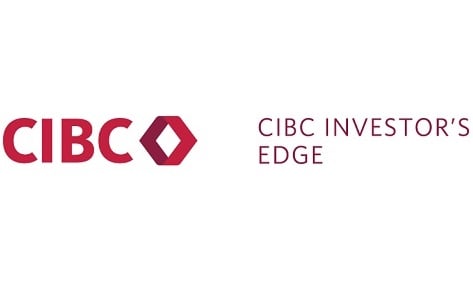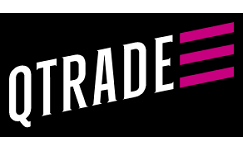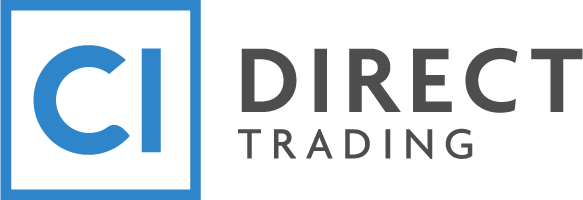6 best trading platforms in Canada
Updated: January 02, 2024
Self-directed online investing has exploded in popularity thanks to the best online brokers driving down costs and making it easy for investors to manage their own portfolios. Gone are the days of $29 trades. Today, investors using an online trading platform can trade stocks and ETFs for free from their mobile devices or access robust market research tools and charts to help them trade like a pro.
Best trading platforms in Canada by category
| Trading platform | Promotion | Get started |
|---|---|---|
| Questrade | Overall best trading platform in Canada | Start Investing with Questrade and get $50 in Free Trades (when you fund your account with $1,000) | Start investing |
| Wealthsimple Trade | Best for commission-free trading | For a limited time, get a $25 cash bonus when you open a Wealthsimple Trade account and fund at least $150 | Start investing |
| BMO InvestorLine Self-Directed | Best big bank brokerage | N/A | Start investing |
| CIBC Investor's Edge | Best for stock trading | For a limited time, with CIBC Investor’s Edge, kick-start your portfolio with 100 free trades and up to $4,500 cash back. | Start investing |
| Qtrade Direct Investing™ | Best for customer service | Get up to $2,000 cash back when you open any new self-directed trading account with Qtrade Direct Investing. Use CASHBONUS2024 and our exclusive link to qualify. Terms and conditions apply. | Start investing |
| CI Direct Trading | Best for research | N/A | Start investing |
What is an online broker or trading platform?
An online broker lets you buy and sell stocks, ETFs, and mutual funds online within your trading account. They’re often called “online brokerage” or “discount brokerage” because this trading method is more cost-effective than a traditional brokerage.
Using an online broker, or online trading platform, you’re the boss: you make the investment decisions and choose what to purchase. While you can purchase individual stocks and bonds through your online broker, most DIY investors opt to build their portfolios out of ETFs. This strategy lets you build a highly diversified portfolio without worrying about buying stocks one at a time.
But with so many platforms out there, you may be asking, “What’s the best online brokerage in Canada for me?” To help you get started, we’ve put together a guide comparing the best online brokers in Canada, as well as some tips on how to choose the best trading platform in Canada for you.
1. Overall best trading platform in Canada: Questrade
- Account maintenance fees: $0 per year
- Trading commission: $4.95 – $9.95 + Free ETF purchases
Already got an investment account with another institution? Moving your investments to Questrade is easy. Just fill out an online form and Questrade will handle the transfer. Plus, it covers any transfer fees up to $150 per account.
On the downside, the account minimum is $1,000. So if you’ve got less than that to invest, you might want to go with a commission-free trading platform (like Wealthsimple Trade account) instead. Investors should also watch out for ECN fees, which are charged on buy/sell orders that are filled immediately (avoid these by placing limit orders).
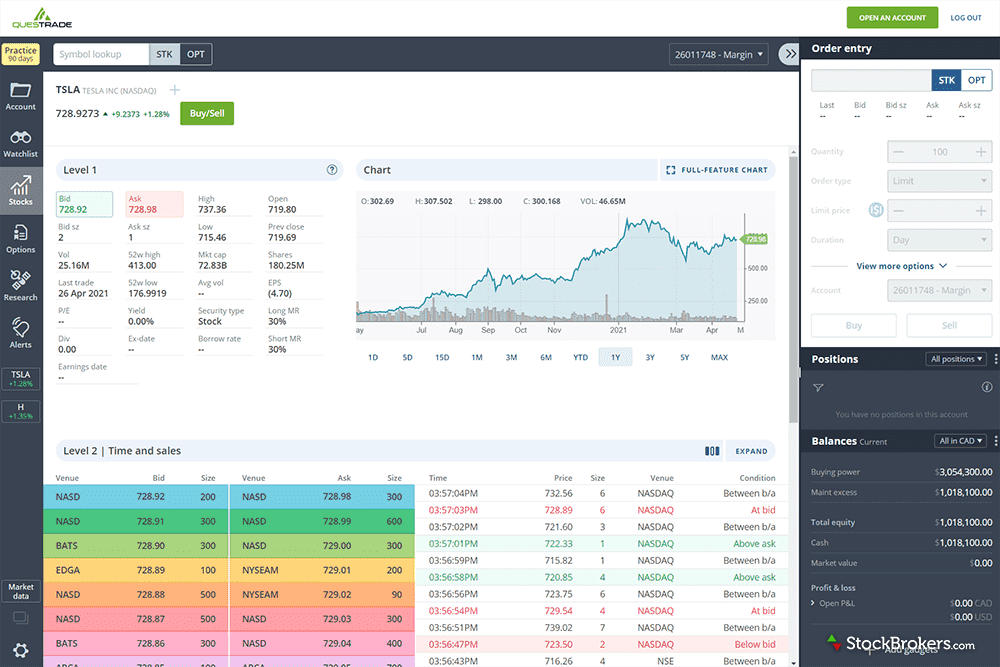
Questrade pros and cons
Pros
-
Low trading fees for Canadian and US stocks
-
No annual fees or inactivity fees
-
Free ETF purchases
-
Pays transfer fees up to $150
-
Instantly deposit up to $3,500 into your Questrade account and start trading immediately.
Cons
-
Need a minimum of $1,000 in your account to start investing
-
ECN fees charged on buy/sell market orders
2. Best online broker for commission-free trading in Canada: Wealthsimple Trade
- Account maintenance fees: $0 per year
- Trading commission: $0
If you’re looking for the best commission-free trading platform in Canada, Wealthsimple Trade account allows you to buy and sell stocks, ETFs, and even crypto without paying any fees. There are also no account minimums, annual fees, or inactivity fees. So you can test-drive the platform without getting hit with trading fees for each transaction.
If you’ve got investments at another institution, you can move them to Wealthsimple Trade using your desktop, mobile phone, or tablet. It also won’t cost you a dime to do this: Wealthsimple Trade also reimburses transfer fees for investment transfers that are greater than $5,000 in value.
The downside: Wealthsimple Trade currently only supports RRSP, TFSA, and non-registered account types, and clients can only hold Canadian dollars.
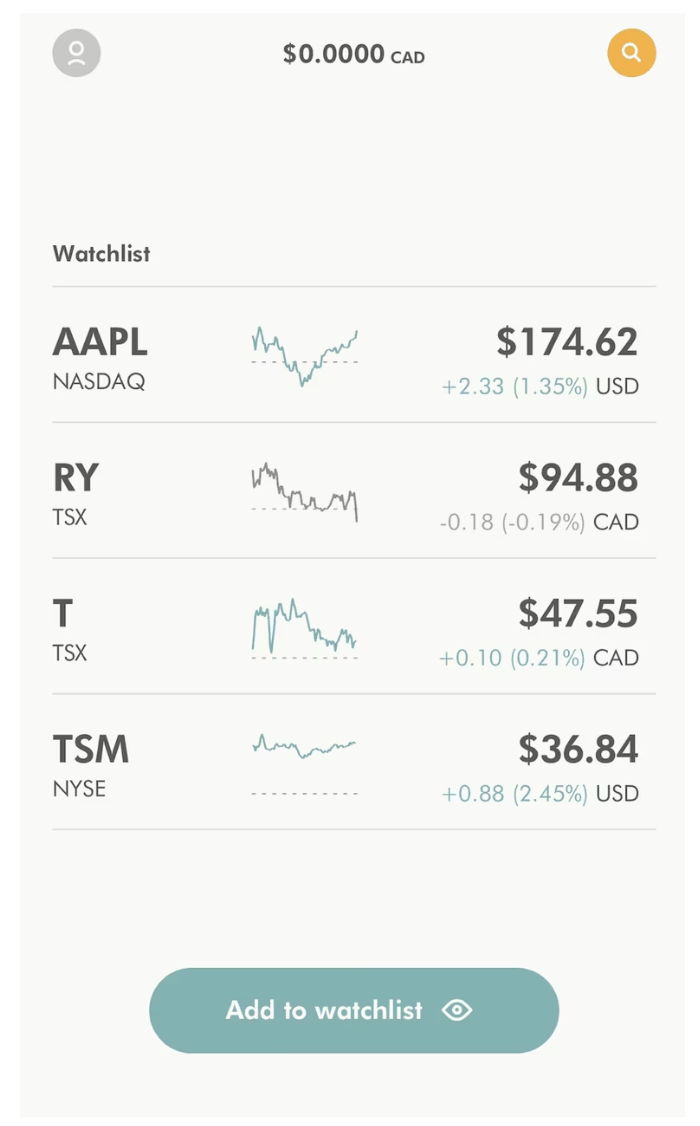
Wealthsimple Trade pros and cons
Pros
-
Commission-free trading
-
Buy fractional shares
-
$0 annual fees
-
Offers crypto trading
-
Reimburses transfer fees for investment transfers that are greater than $5,000 in value
Cons
-
Limited account types (RRSP, TFSA, non-registered)
-
Can’t hold USD so clients pay FX fees when buying and selling US-listed stocks and ETFs with a free account
3. Best trading platform with a big bank: BMO InvestorLine Self-Directed
- Account maintenance fees: $0 - $100 per year
- Trading commission: $9.95
BMO InvestorLine Self-Directed is an excellent choice for anyone looking to get started with an online discount brokerage at a big bank who doesn’t want to pay commissions on ETF trades.
BMO InvestorLine Self-Directed is an excellent choice for anyone looking to get started with an online discount brokerage at a big bank who doesn’t want to pay commissions on ETF trades.
In 2021, BMO InvestorLine Self-Directed launched an impressive list of 80 commission-free ETFs for clients to trade (including Vanguard, iShares, and BMO ETFs).
BMO InvestorLine Self-Directed’s user-friendly portal, along with its impressive library of third-party research and solid customer service, will help you invest with confidence, whether you are a seasoned investor or a complete beginner.
BMO InvestorLine Self-Directed isn’t the least expensive discount brokerage, with fees on accounts under $25,000. Still, their zero minimum balance requirement, 80 commission-free ETFs, and award-winning platform are enough to overcome any drawbacks.
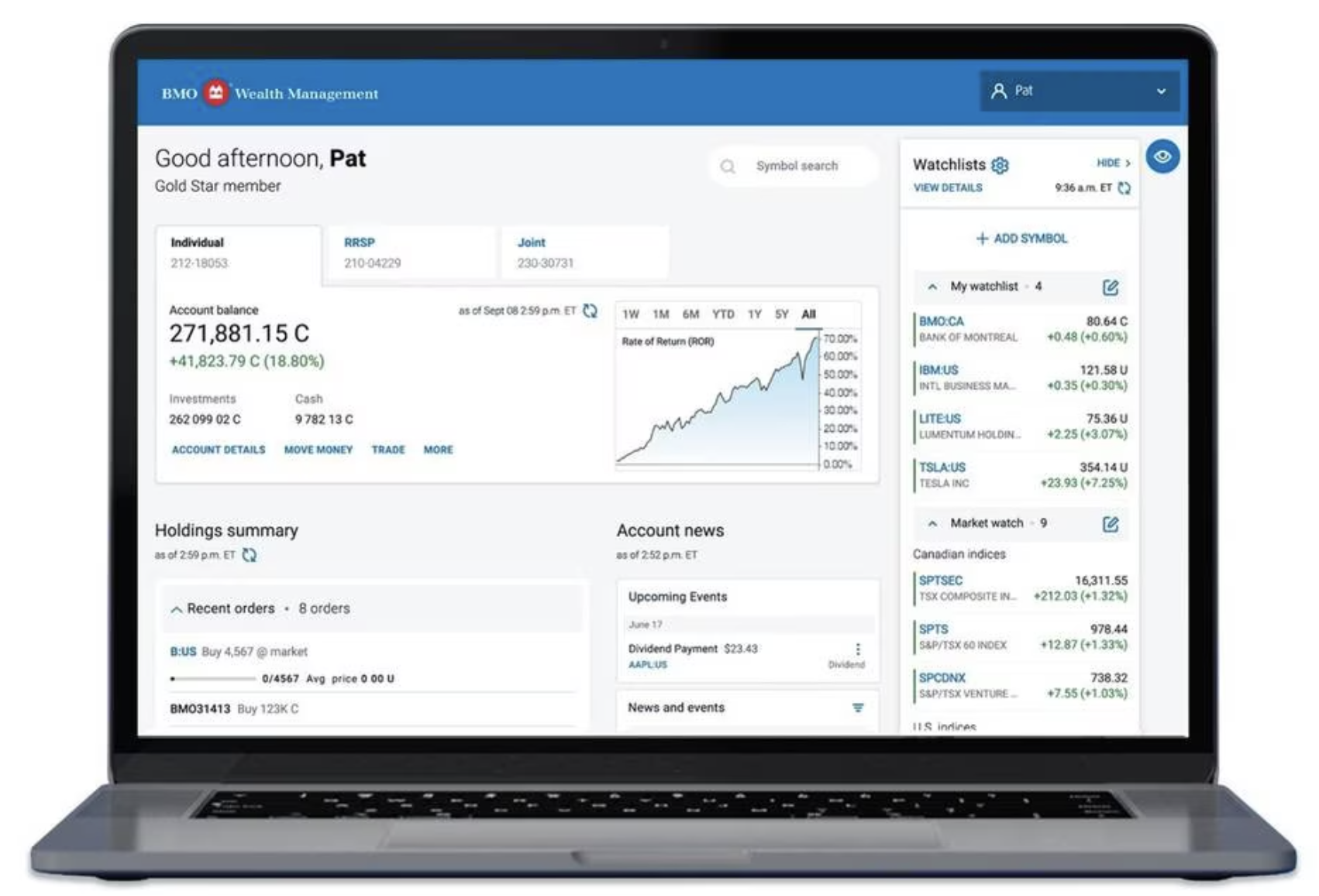
BMO InvestorLine pros and cons
Pros
-
80+ commission-free ETFs to trade
-
Excellent online and mobile app
-
Hold USD and CAD in non-registered and registered accounts
-
Great third-party research
-
$0 minimum account balance for RRSPs and TFSAs
Cons
-
$9.95 per trade on stocks and ETFs that aren’t included in the 80 commission-free list
-
$100 for account balances less than $25,000
4. Best broker for stock trading: CIBC Investor’s Edge:
- Account maintenance fees: $0-$100 per year
- Trading commission: $6.95 per online equity trades only
- Promo offer: For a limited time, with CIBC Investor’s Edge, kick-start your portfolio with 100 free trades and up to $4,500 cash back.
CIBC Investor’s Edge is the discount brokerage arm of CIBC Investor Services Inc. and a subsidiary of CIBC bank. Its newly redesigned website has given the platform a nice user experience.
CIBC Investor’s Edge offers flat fee commissions of $6.95 for stock and ETF trades. That’s the cheapest of all the big bank brokerages, although CIBC doesn’t offer any commission-free ETF trading.
Clients won’t pay account fees when they hold more than $25,000 in their RRSP and more than $10,000 in a non-registered account (TFSAs and RESPs are free).
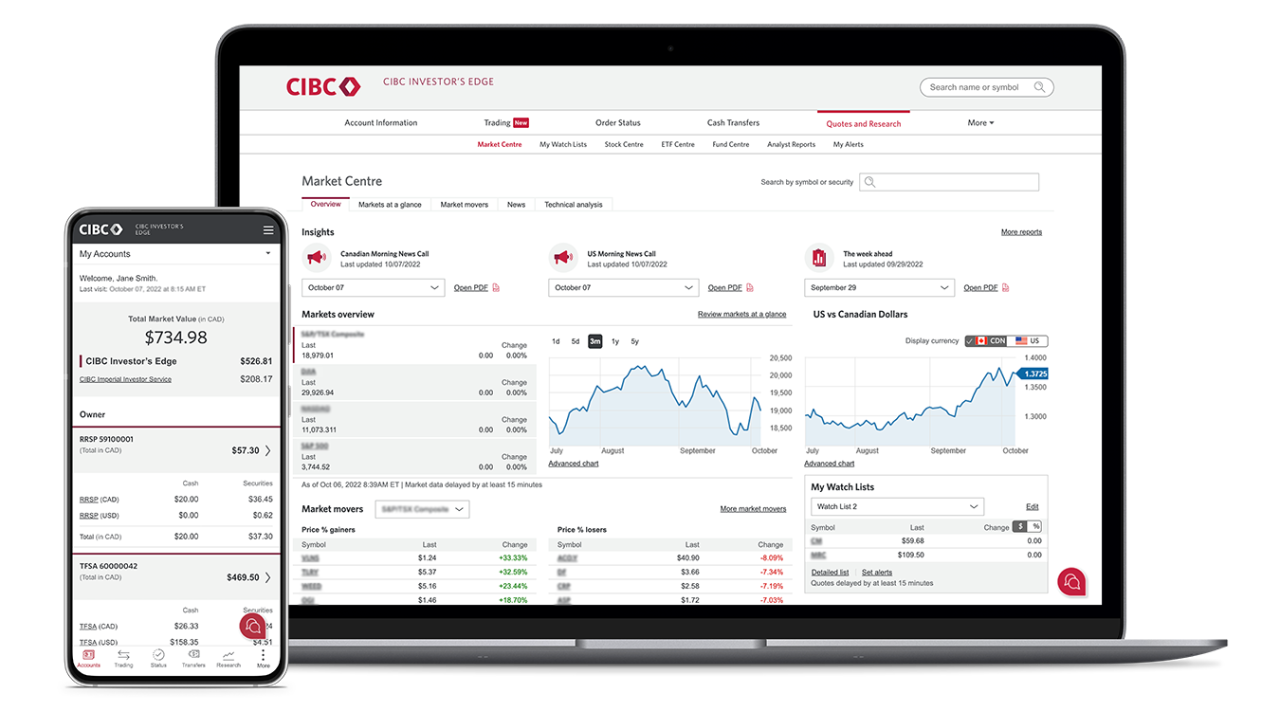
CIBC Investor’s Edge pros and cons
Pros
-
Flat fee stock and ETF trading at $6.95 (lowest among all big bank brokers)
-
Newly designed website
-
Advanced quotes and research
Cons
-
No commission-free ETFs
5. Best broker in Canada for customer service: Qtrade
- Trading commission: $8.75 per trade or $7.75 for young investors
- Account maintenance fees: Qtrade’s quarterly $25 fee is on the high side, but it can be waived if you meet one of these conditions:
Qtrade is a good alternative to Questrade and has a reputation for amazing customer service, ranking in the top 1 or 2 in Surviscor’s annual brokerage reviews. The company is trustworthy, too. Operating since 2001,a division of Credential Qtrade Securities Inc., Qtrade is owned by Aviso Wealth, one of Canada's largest independent wealth management firms, which is entrusted with over $120 billion of investment assets on behalf of 500,000 clients from coast to coast. And is a member of the Canadian Investor Protection Fund and Investment Industry Regulatory Organization of Canada.
If you’re interested in trading ETFs, Qtrade offers over 100 commission-free options. These ETFs cost you nothing to buy or sell with no minimums required, making this a good option for easy and diversified investing at any level.
Maintaining an account with Qtrade is slightly more expensive than Questrade, but still very cost-effective, setting you back $100 per year for portfolios with less than $25,000 in combined assets. This fee is waived if any of the following apply: it is less than one quarter since account opening, you have $25,000 or more in assets, completed 2 commissioned trades in the last quarter, completed 8 commissioned trades in the last 12 months, set up a $100/mo recurring deposit, qualify for the Young Investor offer.
Most investors will pay $8.75 per trade with Qtrade, and there are no account minimums. If you incur fees when transferring your assets to Qtrade, they will cover $150 or more in tax when transferring $15,000 or more.
To better understand what you get with Qtrade, read and compare Qtrade vs. Questrade in our review.
Get up to $2,000 cash back from QtradeQtrade pros and cons
Pros
-
Second-to-none portfolio analytics tools and multiple portfolio views
-
In-depth research and analysts’ reports
-
Stock/ETF/mutual fund screening tools
-
$8.75 and $6.95 stock trades and 100 free ETFs (free to buy and sell, no minimums)
-
Use stop-loss, stop-limit, trailing-stop orders
Cons
-
Fees for portfolios smaller than $25,000 may apply
6. CI Direct Trading (formerly Virtual Brokers): Best online broker in Canada for research
- Account maintenance fees: $0 - $100 per year
- Trading commission: $1.99 to $7.99
CI Direct Trading ( formerly Virtual Brokers) is one of the best online brokers in Canada, with offerings on par with Questrade and Qtrade.
CI Direct Trading offers free ETF trades, which is perfect for index investors, and they charge 1 cent per share for stock trading (minimum $1.99, maximum $7.99). There is a $25 per quarter fee on accounts with balances under $5,000.
CI Direct Trading has several trading platforms to choose from and a huge research center to help you stay ahead of the curve when making trades.
CI Direct Trading pros and cons
Pros
-
Free ETF purchases
-
Stock trades at 1 cent per share (minimum $1.99)
-
No fees for accounts over $5,000
-
Excellent research tools for beginner to advanced investors
-
Robust investment performance reporting options
Cons
-
$1,000 minimum account balance
Comparing the best online brokers in Canada
Online brokers vs. traditional brokers
A traditional broker, sometimes called a full-service broker, is a person that invests in the stock market on your behalf. You give them direction and insight into your risk tolerance and financial goals, and they recommend investments and execute trades for you.
An online broker is best for those with portfolios of less than $250,000 and who want to manage their investments themselves.
Investing literacy
Though some online brokers may provide investment education materials for their users, they generally do not provide personal consultation with the investor.
Investors who do not have the time, patience, or interest needed for responsible self-directed trading and the regular research and autodidactic education it requires might be better off with either a full-service stock broker or a robo-advisor. Check out our list of the best robo-advisors in Canada if you prefer a ‘set it and forget it’ investing approach.
Online broker service cost
Though fee amounts and structures may vary from one online broker to the next, they save an enormous amount on overhead by being based primarily online, and will invariably be less costly overall than what you will pay with a full-service broker.
There’s no hard and fast rule as to what portfolio value you need before it makes financial sense to work with a full-service broker, but a rule of thumb is that those with combined assets of $250,000 or more should at least consider moving away from online or discount brokers and robo-advisors toward working with a traditional stockbroker.
Emotionality and broker bias
Market volatility can make investors prone to rash, emotionally driven decision-making, and it’s easier to give in to that when you can make trades with a single click.
Working with a full-service broker can serve as a rational counterpoint to any knee-jerk decisions you might make independently. Conversely, some full-service brokers may receive financial compensation for selling a specific mutual fund or stock, which can compromise the impartiality of the trading advice they give you.
When you make your own trades, you are making decisions based solely on your own best interest.
How do online brokerages work?
Online discount brokerages work by facilitating the buying and selling of stocks, bonds, mutual funds, ETFs, and other forms of investment through various stock exchanges. Investors can sign up to use a brokerage’s trading platform, and the brokerage charges the investors fees based on trading volume, activity/inactivity levels, and currency exchange. Investors autonomously choose when to buy or sell their investments.
What are the downsides of investing with an online brokerage?
While online brokers have many advantages (convenience, little to no commission fees, and easy access to trends and company information to name a few), there is one major downside to online trading — you may find yourself easily addicted. The ability to make a trade with just the click of a button may become distracting, preventing you from fulfilling other important activities. Keep this in mind before you begin using an online brokerage and set rules for yourself!
How to choose the best trading platform in Canada
It’s easy to be seduced into signing with the online broker that offers the lowest trade fees, but you should consider more factors than that when comparing the best trading platforms in Canada.
Compare the user interface for each online brokerage
Get a feel for an online broker’s platform by checking out some of its preview videos. Do the account management and trading interfaces seem simple and user-friendly? Is the platform available on both mobile and desktop? Is the provided amount of stock info scanty, overwhelming, or just enough?
Keep in mind that some online brokers update stock trading quotes in real-time, but others have a lag, which could be problematic for high-volume traders, like day traders.
Investor education
Those who are trading independently for the first time might opt for an online discount broker that has extensive investor education resources in the form of tutorial videos, blog articles, FAQs, etc.
Some online brokers might also offer a combination of autonomous trading with personalized advice from investing experts, akin to working with a full-service broker. This might be an attractive option for those who are new to investing, but it could be unnecessary for experienced traders.
Related: Investing in stocks 101: The who, the why, the how
Account minimums
Some online brokers require no minimum investment to open an account; others require a minimum investment of several thousand dollars. Keep the amount you’d like to start investing with in mind when researching brokers and make sure it isn’t below the minimum of a broker you’re interested in.
Trading platform commissions and fees
Fees aren’t the only factor to consider, but they are certainly one of the most important. Consider the types of investments you plan to make—stock trading, options, ETFs, mutual funds, bonds, etc.—and check out the different commissions each broker charges on those.
Keep in mind that a broker might charge not only fees for each trade, but also fees for account maintenance, currency conversion, inactivity, and closing/transferring out an account. Some brokers may offer commission-free trades or reduced fees for investors that make a minimum number of trades per month. If you plan to trade frequently, or if you have ambitions to become a day trader, you might opt for a broker with a trading fee structure that incentivizes frequent trading.
Compare online broker sign-up bonuses
If you find yourself stuck between two options that have a seemingly even number of pros and cons, check with both to see if one of them might offer a special sign-up bonus that you may not have noticed, like cashback.
Some online brokers, particularly those administered by banks, might also incentivize the use of other financial products, like savings accounts or credit cards, in tandem with their investing platform.
Day trading
Many day traders use online brokerages in order to execute their quick exchanges within the same trading day, due to the little to no trading commission fees that come along with many online brokerages. All of the above online brokers can be used for day trading, with Questrade being one of the top favourites, as it offers discounts if you’re an active trader.
How to open a brokerage account
- 1.
Start by checking if the broker you’re interested in has a minimum investment requirement, and compare that with how much you can afford to invest.
- 2.
If you meet your new broker’s minimum investment requirement you can fund the account by transferring money from a bank account or another broker into your new online broker. This process should take anywhere from a few days to a week or so.
- 3.
Document any fees charged to you for moving money out of your bank account or previous broker into your new broker, as your new broker might have a policy in which it will reimburse you up to a certain fee amount.
- 4.
Go through any tutorials offered by the broker that might explain how to use its online platform and review any investor education materials it offers as well.
- 5.
Start buying stocks, ETFs, bonds, and mutual funds to your heart’s content!
Which online brokerage is best for beginners?
Questrade, Wealthsimple Trade, BMO InvestorLine Self-Directed, Qtrade, and TD Direct Investing are all great options for beginner stock traders. Due to the fact that Wealthsimple Trade offers no basic trading fees and no annual account fee, this is an ideal choice for younger investors and those who simply wish to try their hands at trading.
Divest from high commissions
Test out an online broker that has no account closure fee or even commission-free trades and then fund the account with the minimum amount required.
That way the stakes are relatively low, and the errors you make while learning the ropes of self-directed trading will have a minimal effect on your financial future. But one thing is certain no matter which online broker you open an account with: Responsible self-directed investing can dramatically increase your overall level of investing knowledge and seriously cut down the fees you would otherwise pay to a robo-advisor or full-service broker, thus increasing your overall return on investment.
FAQs
The bottom line on online brokers in Canada
When it comes to getting the most out of your portfolio, the best option is to invest your money yourself, cutting out the middle person and vastly reducing the fees you’ll pay over the lifetime of your investments. While using an online broker to invest your money may seem intimidating at first, a simple portfolio built out of ETFs will give you the growth needed to reach a comfortable retirement, while keeping you in the driver’s seat of your money.
All of the online brokers listed above are good choices, but each has strengths and areas for improvement. However, if you’re looking to take the hassle out of DIY investing plus save big on fees, Questrade is your best bet and our top choice for the best online brokerage in Canada. Ultimately, the right one for you depends on your financial situation, but it’s not a question of if you should switch to an online broker to manage your money – it’s when.
Online brokerage services are offered through Qtrade Direct Investing, a division of Credential Qtrade Securities Inc. Qtrade, Qtrade Direct Investing, and Write Your Own Future are trade names and/or trademarks of Aviso Wealth.
Disclaimer
The content provided on Money.ca is information to help users become financially literate. It is neither tax nor legal advice, is not intended to be relied upon as a forecast, research or investment advice, and is not a recommendation, offer or solicitation to buy or sell any securities or to adopt any investment strategy. Tax, investment and all other decisions should be made, as appropriate, only with guidance from a qualified professional. We make no representation or warranty of any kind, either express or implied, with respect to the data provided, the timeliness thereof, the results to be obtained by the use thereof or any other matter.
-1691451033.png)
